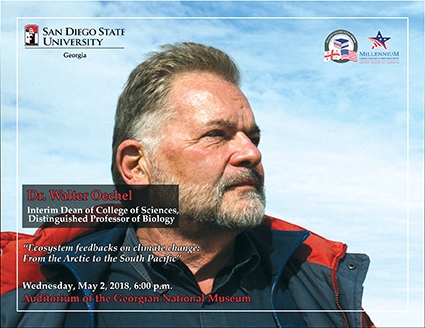Public Lecture: ‘Ecosystem Feedback on Climate Change, from the Arctic to the South Pacific’
On May 2, SDSU Georgia hosted the public lecture by Interim Dean of College of Sciences, distinguished Professor of Biology, Dr. Walter Oechel: “Ecosystem feedbacks on climate change: From the Arctic to the South Pacific.” The event was organized at the Auditorium of the National Museum of Georgia.
Professor Oechel provided highlights of current and recent research in Arctic Alaska, the California Chaparral, Indonesia, and coastal waters of California and American Samoa. He highlighted how climate change and human activity can affect greenhouse gas fluxes from terrestrial and aquatic ecosystems and thereby impact atmospheric feedback on warming.
Professor Walter Oechel is internationally recognized for his pioneering research on global change impacts, which has focused on the field manipulations of [CO2], water, and temperature and on the measurement of the effects of climate change on ecosystem energy, water and carbon fluxes in Arctic, chaparral, tropics, and peatland ecosystems.
Dr. Oechel has received numerous awards for research and education, including the National Science Foundation Director’s Award for Distinguished Teaching and Scholarship 2005 (one of eight nationally), Thomas Reuters: “Most Influential Scientific Minds-2014” and Best Practices in Education. Best Practices Showcase San Diego, 2002. He is an ISI Highly Cited Author.
Professor Oechel is currently Interim Dean of the College of Sciences, Distinguished Professor of Biology, Co-director of the Center of Climate and Sustainability Studies, and Director of the Global Change Research Group at San Diego State University.
He was the first to show that Arctic ecosystems, a long-term sink and repository of atmospheric CO2, could become a source to the atmosphere. In fact, the North Slope of Alaska, which had been a sink of carbon for atmospheric CO2 through the Holocene, became a source of CO2 to the atmosphere from the mid-1970s.
Through his research, Professor Oechel was able to provide the first documented case not only of climate change impact on ecosystem metabolism, but the first clear case of a positive feedback by an ecosystem on global warming.
As part of this work, he has pioneered a complex field manipulations of [CO2] and climate, boat-based and airborne methods of remote sensing and flux measurement, and is a recognized world expert in these areas.
The seminar provided an opportunity to hear first-hand about Professor Oechel’s current innovative research and the range of ecosystems and for guests to obtain improved understanding of both temporal and spatial feedback from ecosystems on climate.












